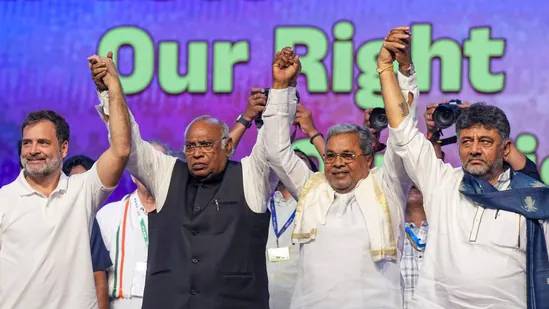NEW DELHI, India (August 8, 2025) — As tensions rise between the Election Commission of India (ECI) and the Congress Party, senior Congress leader Rahul Gandhi on Friday responded defiantly to the poll panel’s demand that he submit an affidavit backing his explosive allegations of “vote theft” and collusion between the ECI and the ruling Bharatiya Janata Party (BJP).
Speaking at the Congress-led ‘Vote Adhikar Rally’ in Bengaluru, Gandhi said he had already taken an oath — not one demanded by the commission, but the one required of all elected Members of Parliament.
“The Election Commission demands an affidavit from me. It says I must take an oath. I’ve already taken the oath of the Constitution in Parliament,” Gandhi said to applause from the crowd.
Gandhi also escalated his attack on the Commission, alleging that ECI websites in Madhya Pradesh, Rajasthan, and Bihar have been shut down following his public claims — an act he claimed was aimed at preventing scrutiny.
“When the people of this country start questioning their data, the Election Commission shuts its website. They know that if the public starts questioning them, their structure will collapse,” he said.
The Allegations
The confrontation stems from a press conference held by Gandhi on Thursday, where he alleged “vote chori (theft)” in several constituencies, particularly in Karnataka’s Mahadevapura Assembly segment, a key part of the Bangalore Central Lok Sabha constituency.
Gandhi claimed his party’s analysis of voter data from the 2024 Lok Sabha elections revealed over 100,000 fraudulent votes, including:
- 11,965 duplicate entries
- 40,009 fake or invalid addresses
- 10,452 bulk voters registered at single addresses
- 4,132 invalid photos
- 33,692 voters misusing Form 6, which is used to add new voters
He alleged that this pattern of manipulated rolls tipped the scales in crucial contests and was part of a wider “vote theft model” being implemented across the country with ECI complicity. Gandhi claimed the Congress was poised to win 16 seats in Karnataka but fell to nine, prompting a deep dive into constituencies like Mahadevapura.
Citing examples like one individual allegedly appearing on voter rolls in three states, Gandhi further suggested that fraudulent voter additions ahead of the Maharashtra Assembly elections outpaced new registrations over the previous five years.
“In five months, more voters were added than in five years. More voters than the entire population of Maharashtra,” he said, also pointing to sudden spikes in turnout after 5 p.m. on election day.
ECI Demands Proof and Declaration
In response, the chief electoral officers (CEOs) of Karnataka and Maharashtra issued letters to Gandhi demanding a sworn affidavit and specific voter details to substantiate his claims, citing Rule 20(3)(b) of the Registration of Electors Rules, 1960.
The ECI warned that if Gandhi believed his analysis to be true, he should have no hesitation in submitting a signed declaration. Otherwise, officials said, he should issue a public apology for making “absurd allegations.”
The Maharashtra CEO emphasized that the electoral rolls were shared with political parties in August and September 2024, and that Congress did not raise objections at that time.
“You are kindly requested to sign and return the enclosed Declaration/Oath along with the name(s) of such elector(s) so that necessary proceedings can be initiated,” the letter to Gandhi stated.
Legal Stakes and Political Implications
Gandhi’s refusal to sign the affidavit sets up a potential legal and constitutional confrontation. If he proceeds without providing the declaration, the ECI may attempt to discredit his claims or pursue legal remedies, while the Congress will likely amplify its accusations of institutional bias.
Gandhi’s comments also come at a time of heightened scrutiny of India’s democratic institutions, with the opposition INDIA bloc questioning election fairness, transparency, and the neutrality of constitutional bodies.
Calling for judicial intervention, Gandhi said the time had come for “the courts to step in and save democracy.”
As the standoff deepens, the matter is expected to dominate headlines and parliamentary debate, with broader implications for electoral reforms, voter trust, and the balance of power between political opposition and electoral authorities in the world’s largest democracy.

